| marie-hélène le ny |
|
photographiste |
|
"I
grew up in Cadiz, where I studied English and French. In English,
I had teachers who would make us discover authors, who would
confront us with new questions of sexuality, feminism, gender,
"race". They would make us approach these new questions
by breaking down the barriers of our imagination. Then I studied
French and discovered French-language African literature. As
a student-collaborator, I worked with a lecturer who was focusing
on the education of girls who would become the first female primary
school teachers in Senegal's rural areas - the first women to
wrtite and publish. I analysed quite a number of doculents and
texts which made me understand the importance of women's education.
Later, as a teaching assistant in Martinique, I discovered Poto
Mitan women and read Gisèle Pineau and Maryse Condé,
whose work I found very interesting. Men had never ventured into
these fields! I completed a master's degree on the representation of the Rwanda genocide by women, which helped me discover new ways of thinking and encouraged me to do a thesis on extreme gender-based violence. Fear is instilled quite insidiously in women of all cultures and all ages. We never feel legitimate! In the Gradiva group, we challenge these male/female paradigms. As a contractual lecturer, I teach language and translation on a part-time basis in order to continue my research, from which my lectures are drawn. Currently, I am working on Rosario Ferré, a Puerto Rican author who wrote in Spanish and English and whose work I had the pleasure of translating. I explore the mother tongue theory, which comprises all our languages, such as maternal, acquired, adopted, adapted, and used. Language provides a model of meaning that helps us indrstand what our senses perceive, everything that we incorporate into a language of our own!" |
|
||
|
Nathalie
Narvaez, |
|||
|
|
|
|
